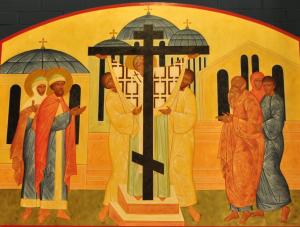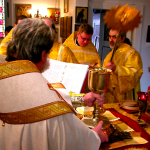
Paul reminds us that our religious devotions, our acts of piety, should not be done out with a desire to bring attention to ourselves, hoping to receive accolades from those who watch us. We are not to be vainglorious or prideful. We are to engage our faith out of a pursuit for and love for that which is good, a good which is of value in and of itself. Acts of religious piety can be good, as they can help connect us with the divine (and with others), but they must be understood as a means to an end and not an end in and of themselves. Ultimately, we are to look to Christ, not ourselves, and glorify Christ for what he has done, including and especially, the way he willingly suffered on the cross on our behalf. When we do so, we will see that God has turned the cross into the instrument not only of our own salvation, but Christ’s glorification.
To properly glorify Christ for what he did for us on the cross requires from us much more than words. It requires more than deeds. It requires a heart which is open to the way of the cross. We need to open our hearts to what is revealed to us in the cross, and then, we should let our words and deeds reflect upon what is found in our heart. If we do so, we will find ourselves engaging the cross by following what it represents, the way of self-denial, and not just any kind of self-denial, but the denial of our own false self and the evil which has created that false persona.
When we lift up the cross as a sign of God’s love for us, we glorify what was accomplished through it and not the evil of the crucifixion itself. God turned the cross, an instrument of evil and oppression, into a means of our liberation. We certainly should not see such glorification of the cross as a glorification of the evil which was done by the means of a cross, that is, but the way oppressors used it as a tool for domination and control. We must resist any attempt to once again use the cross as a means of oppression. We must not think that because Jesus let himself be executed on it, that God now has affirmed the death penalty. That is absurd. We must resist that line of thought. We must reject the way of death. Just as Jesus overcame death by death, so we can see, Jesus has deconstructed and shown us to reject the death penalty by means of the death penalty itself.
Certainly, more than just the death penalty has been deconstructed and rejected by Christ. Through the cross, Christ shows us the way he works with creation, engaging the evils found in it, taking them upon himself in order to deconstruct and conquer those evils, so that those evils can ultimately be turned to naught and the world can be liberated in the eschaton. Evil people, that is, those who do evil, can become good, made into the persons God intended them to be, because Jesus willingly takes their evil upon themselves, freeing them from the false self such evil created; this is what we see happened with Paul. We are to glorify the cross, and in doing so, glorify God, thinking not of ourselves, but of the greater good. We are to embrace what is indicated by the cross; we are to see it as a sign of change. We should detach ourselves from all our selfishness, our false persona or self, letting it all perish so that we, following after Paul, can also become the person God intended us to be.
The cross is is to be glorified, but it is to be glorified with the proper spirit. There are many ways to do this. Indeed, over time, we will find some will come and go, while others will remain. Thus, as Paul said, those who want Christians to engage some specific forms of religious piety as being necessary for all, those who think their preferred forms of piety are necessary and should be embraced by all at all times, do not understand the proper place of piety. They end up being vainglorious instead of truly pious:
See with what large letters I am writing to you with my own hand. It is those who want to make a good showing in the flesh that would compel you to be circumcised, and only in order that they may not be persecuted for the cross of Christ. For even those who receive circumcision do not themselves keep the law, but they desire to have you circumcised that they may glory in your flesh. But far be it from me to glory except in the cross of our Lord Jesus Christ, by which the world has been crucified to me, and I to the world. For neither circumcision counts for anything, nor uncircumcision, but a new creation. Peace and mercy be upon all who walk by this rule, upon the Israel of God. Henceforth let no man trouble me; for I bear on my body the marks of Jesus (Gal. 6:11-17 RSV).
We would be wrong to think what Paul wrote was intended to be a rejection of his Jewish heritage, and with it, its use of circumcision. What he was concerned about is the way some wanted to make circumcision into something it was not intended to be, that is, those who wanted it to be a universal requirement for everyone. He did not believe Gentile converts needed to be circumcised. Circumcision was for the Jews. He believed it continued to have value. However, he also thought that those who would try to make it into a universal obligation, into an issue of religious piety that all Christians must embrace, go against its proper value, the value seen in the intention God has for is establishment. Circumcision was meant to symbolize the way people were meant to cut themselves off from undue fleshly attachments in the world (i.e., circumcision of the heart). This is why he pointed to the cross, because the cross and what it represents correlates with what circumcision was intended to symbolize. Glorifying in the cross, embracing the self-denial which Christ said we should embrace, continued the intention God had with circumcision.
We are called to have faith in Christ, to engage Christ in all we do, to love Christ and with that love, receive the grace we need to to transcend ourselves. Christ did not come into the world to judge or condemn us, but to lift us out of our enslavement to sin. “For God sent the Son into the world, not to condemn the world, but that the world might be saved through him” (John 3:17 RSV). Christ took on the cross, showing us the way of true self-transcendence is the way of self-emptying love. We are to put to death our false self and all the pride and vainglory it wants us to have. If we do so, we will find ourselves capable of being joined with Christ and sharing in the true glory which is found with him. The more we attempt to show off our faith and glorify ourselves by doing so, the further we are from what God wants from us; This is why acts of piety which can be good, but they can also be abused, leading us away from that good if we do not engage them with the right intent. Let us, therefore, glorify the cross in word, in deed, but also in the right spirit, lest we find our glorification of the cross is all show and our glorification of the cross turns out being done in vain.
Stay in touch! Like A Little Bit of Nothing on Facebook.
If you liked what you read, please consider sharing it with your friends and family!
N.B.: While I read comments to moderate them, I rarely respond to them. If I don’t respond to your comment directly, don’t assume I am unthankful for it. I appreciate it. But I want readers to feel free to ask questions, and hopefully, dialogue with each other. I have shared what I wanted to say, though some responses will get a brief reply by me, or, if I find it interesting and something I can engage fully, as the foundation for another post. I have had many posts inspired or improved upon thanks to my readers.












